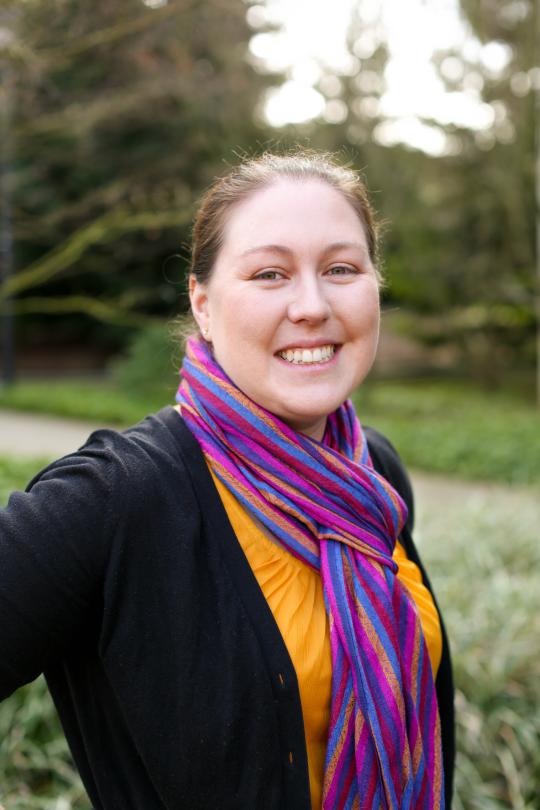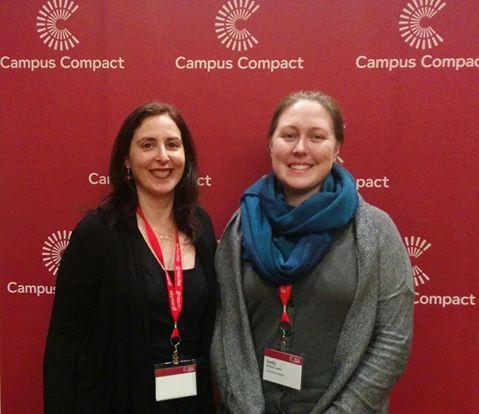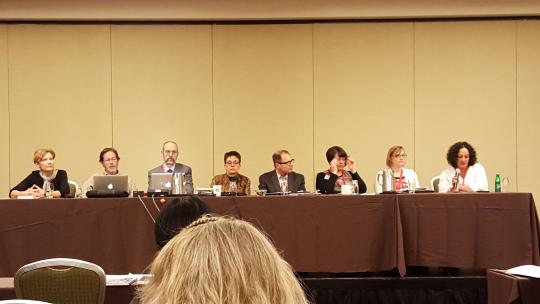How to Get Published in a Community Engagement Journal
At the 30th Anniversary Campus Compact conference, there was a rare opportunity to hear from seven editors (or their representatives) of service-learning and community engagement journals. The fact that there are so many journals out there on this topic shows that no matter what type of paper you might be interested in writing regarding service-learning and community engagement, there is likely a home for your research, reflection, case study, or book review.
The seven journals have different angles on the type of work they feature, but each focused on community engagement and service-learning in some capacity. Each representative from the journal talked briefly about their specific journal, how they define community engagement and/or service-learning, and the types of pieces that they tend to publish. They all had great insight on the publishing process and the focus of the work in their particular journals.
Jeffrey Howard, the editor of Michigan Journal of Community Service Learning, started off the session discussing the four categories of work that he publishes. One was teaching and learning with service-learning, the second was research on and related to service-learning, the third was scholarship of engagement, and the fourth was scholarship on engagement. The Michigan Journal is particularly interested in global service-learning research and case studies. Other panelists agreed that the research on is international service learning is lacking. The idea of service learning is fairly new in many parts of the world and how it is defined varies greatly.
[Related: Exploring Publication of Service-Learning and Community Engaged Scholarship]
Diane Jones represented the Journal of Higher Education Outreach and Engagement continued by saying that they use the Carnegie definition of community engagement and that they focus more on research-based methods of community engagement with an international focus.
Kevin Bott from Public: A Journal of Imagining America discussed how this journal really focuses on how community engagement is used in the Arts and Humanities realm. He said that the areas that they focus on for publication include public engagement, work about, with, and for communities, professional choices for faculty, and a flexible framework for evaluating academic scholarship.
Christina Kirklighter, the editor of Reflections: A Journal of Public Rhetoric, Civic Writing, and Service Learning talked about the journal's focus on rhetoric and composition. She mentioned that the best scholarship that they like to publish is that which involves the communities in a meaningful way.
Andrew Furco, co-editor of The International Journal of Research on Service-Learning and Community Engagement, talked about research as one way to advance the field of service-learning. He said that though research is one type of scholarship, they also publish a works-in-progress section of the journal to encourage people to share work that is not fully completed.
[Related: Service-Learners Make More Money]
Jennifer Pigza from Engaging Pedagogies in Catholic Higher Education discussed how they tend to focus more on case studies, theoretical pieces, and academic and curriculum-based pieces.
Tabitha Underwood, co-editor of Journal of Public Scholarship in Higher Education, and said that they like to publish work that leads to the creation of new knowledge through engagement. They prefer qualitative pieces with a lot of theoretical and reflective pieces.
Marybeth Lima, editor of Journal of Community Engagement and Scholarship, said that they publish articles on community engaged teaching within all disciplines and that they specifically look for research that is co-written by those who are involved at all levels of the community engagement process, such as students in the course, faculty, and community partners. Marybeth made a specific call for more student authored papers and mentioned that they will help with revisions to get the papers in publishable form. Several of the other panelists also said that they wanted to have more student and community voices heard in their journals as most pieces are written by the academics involved in community engagement and service-learning.
During the Q&A, someone asked where there are gaps in the community engagement and service-learning research and everyone in the panel agreed that there needed to be more research on the impact on communities. One journal representative said that we all buy into service-learning and community engagement and think it is great for everyone involved but there is not a lot of research on the actual affects that the work has on the communities. This is an incredibly important area of research that could use extensive research to see how communities and community partners are impacted by engaging in service-learning projects.
Overall the session was interesting and insightful as the ideas of what service-learning and community engagement are and how they are defined varies slightly depending on what the journal's perspective is. The CCE can provide support with your submission and many journal issues, including the entire collections of the Michigan Journal and Reflections, are available for you to view.

Author: Emily Acosta-Lewis





